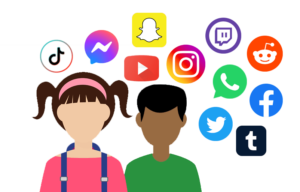How can schools integrate digital citizenship into existing curricula without it feeling like an ‘add-on’?
This was the topic presented by classmates Miranda, Jenni, and Allysia this week. Reflecting on my own digital citizenship – or any media instruction – in my current role as a grade 3/4 teacher, I have been guilty of having more “one-off” lessons or units, rather than embedding it throughout the various outcomes. This has become a goal of mine this year, and although I have been able to have a few conversations with my students regarding digital citizenship that has tied into what we are already learning, I have a long ways to go.
Miranda, Jenni and Allysia shared through their videos and the resources provided, that a barrier to teaching digital citizenship is the lack of integrated curriculum, or that teachers feel they need to reinvent the digital citizenship curriculum, however, as explained in the ISTE resource Embed Digital Citizenship in all subject areas, teachers can simply “hack” the outcomes, or integrate it to what we are already teaching.
Speaking of not “reinventing the wheel”, I was aware of resources such as common sense education, however if it was not for this course, I honestly am unsure if I would have dug deep into the various lessons to find those resources. Because digital citizenship is not at the forefront of our divisions strategic plan, as well as the new technology ‘ban’, I am curious if other educators are simply putting digital citizenship on the backburner for now. In order to teach these skills, educators also need to feel comfortable with digital/media skills. Could this be another barrier? Are teachers feeling unprepared to teach the resources? I hope in the future and with the revamping of curriculum outcomes that language around digital use and technology can be more embedded in the curriculum, so that we do not have to “hack” the outcomes, but instead it would be common practice. Maybe wishful thinking?
Thinking of my own practice, I always give myself “baby step” goals each year which usually align with our divisions strategic plan. For instance, Indigenous Content and embedding indigenous ways of teaching, history, and content has been one of our goals. Each year I have slowly been increasing my own experience and adding more into my teaching practice. I feel this will be the same with teaching digital citizenship. As I am becoming more comfortable understanding the various aspects, become more comfortable with resources and scope and sequences such as Ribble’s Digital Citizen Progression Chart, I am finding myself looking for ways to include digital citizenship into our everyday lessons.
Moving forward, I am looking forward to using Common Sense Education, delving into some of our health and ELA outcomes to see where I can incorporate digital citizenship, and supporting colleges with resources as well (I’ve shared quite a few of these resources already – I think they might be getting sick of me!). Thank you to the videos and resources provided, as they show it may be easier than we think to embed digital citizenship into our curriculum, it just means we need to be willing to adjust and take the time to do so.

Hello Kathleen! You raise such an important issue in your post — TIME! I too find myself drowning in new initiatives with no time given to build the skills and competencies required to actually implement them in meaningful ways. For new teachers, I find they need at least 3 years with their curricula before they see connections and interdisciplinary links, in addition to parallels with strategic plans. For experienced teachers, tech tools themselves require time to become familiar with their functions and potential in the classroom.
Nowhere in the strategic plans are digital citizenship skills discussed, the language is absent from curriculum documents, and no where are they assessed on the report card. This is the perfect equation for something feeling like an add on, despite how important we all know it is. I do love the Common Sense Media resources as the lessons are so few per year — it makes it feel much more manageable. I too hope for a future curriculum that includes this language, but I do not have a lot of hope as we have been working on renewing the senior Social Studies Curriculum since the 90’s to no avail.
This was a great read – I agree with your thought that hopefully soon this will be already written into the curriculum, instead of us needing to hack the outcomes.
Maybe digital citizenship eventually just becomes regular citizenship, since it is such a big part of our lives at this time!